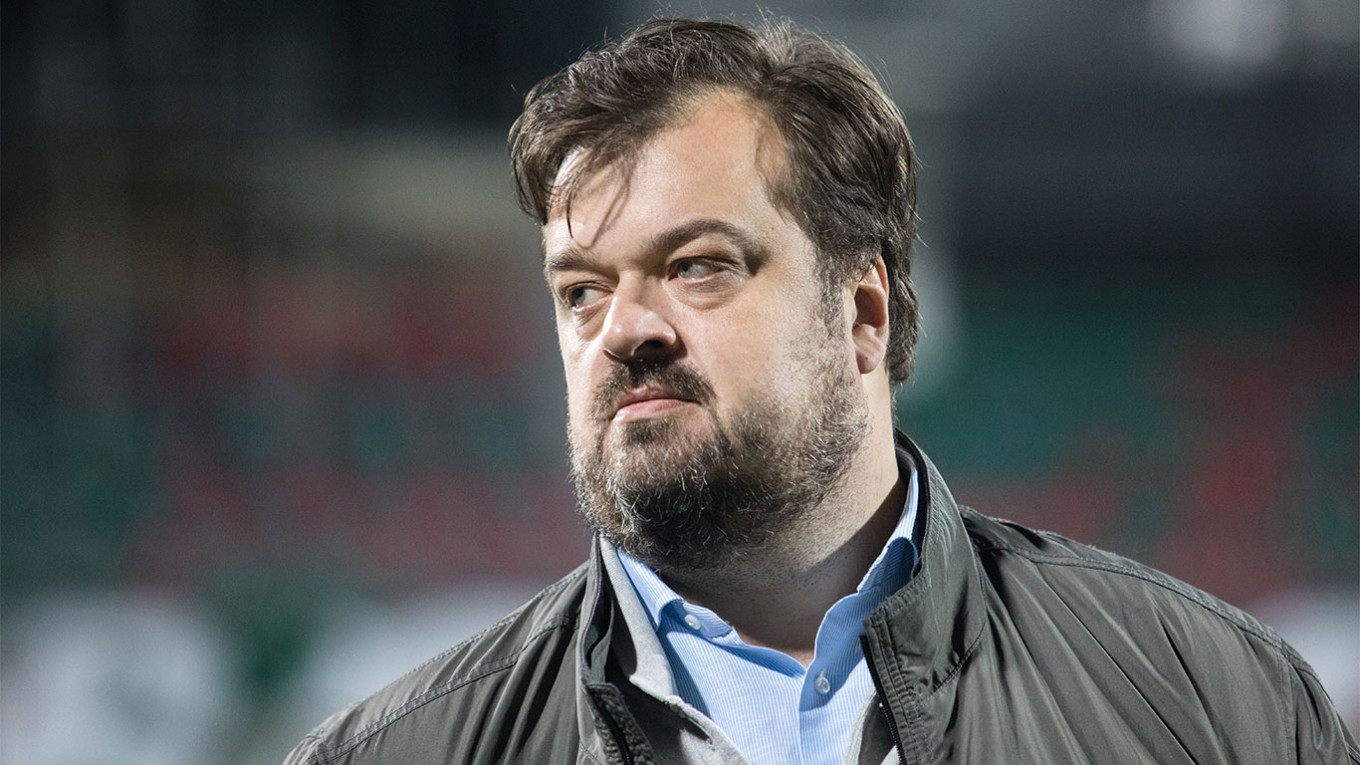President Vladimir Putin’s wars claim victims even far away from the frontlines. Vasily Utkin — who single-handedly created the modern profession of football commentator in Russia and was barred from major TV channels for his quietly anti-authoritarian, anti-war stance — is now dead at 52.
Those who did not live through Russia in the 1990s will not be able to grasp the extent to which Utkin was a revolutionary. He helped create the best things about Russian journalism. Sometimes awkward and even pathetic in the social media era, cast out of the profession he effectively created in Russia, he remained a giant and a beacon of hope for many in a dark hour.
In Soviet times, football glued people to their screens as much as, if not more than today. The U.S.S.R., self-isolated and technologically backward, had minimal access to international matches. Its two state-run TV channels would not have much screen time to air the internal matches either. Yet football commentators enjoyed incredibly high status. The same five or six of them were on air for decades. Compared to today's commentators, the Soviet ones were like classically trained theater actors – composed, with little emotion. But most importantly, they knew little about football.
The football punditry pioneered by Utkin was at a different level of expertise and knowledge. He showed that a commentator must know everything about players, teams, coaches and tournaments, understand strategic minutiae, and be aware of locker room rumors. A single one of his reports contained more information than hours of Soviet news broadcasts. The same revolution was happening in print media. In Russia, sports reporting underwent a transformation long before business and financial journalism.
Yet the Utkin revolution went beyond the professionalization of sports commentary. He was the first Russian journalist whose opinion – rather than rank or even revelations – changed the real world. If he wrote, without providing any evidence, that a match was fixed, insiders and fans knew that the match was fixed.
He was not afraid to express opinions which became a part of the lives of everyone interested in football. That is, practically everyone. In our era of influencers, this may not seem remarkable. But Utkin created this profession in Russia.
As an economist, I have been involved in football professionally, having spent 10 years working on the UEFA Club Financial Control Committee. Yet I rarely watch television broadcasts and cannot distinguish Russian commentators by their voices. Still, I know that in the 2000s, dozens of outstanding commentators emerged, some of whom have become legends. Once you delve into their biographies, you realize many entered the profession because of Utkin. He showed that anyone, even an intellectual, could not only love the beautiful game but could also be a true participant. Kicking the ball was a dream for some kids. But for people like myself, the dream was to be like Utkin.
This was not just about football! When I started working as a political and economic columnist – whether in the business-oriented Vedomosti or the popular Ogonyok – I wanted to be like Paul Krugman and Maureen Dowd, the commentary stars of that time. But even more, I wanted to be like Utkin so everyone, not just insiders, would listen. He was my contemporary, but was also an idol for myself and many others.
Many of these writers saw much more success than Utkin. His biography could easily be written as a chronicle of unfulfilled hopes. He could have commentated on the most important matches of the era. He could have not wasted time arguing online with popular grifters and Putin cronies. He could have chosen better platforms for his opinions. But perhaps it was this inability to make small compromises that made him first a revolutionary and then a legend.
His political views demonstrated very clearly how well he understood the situation and how unwilling he was to change his views for his benefit. He was against the war with Ukraine. Before that, he opposed Putin’s dictatorship, repression, the 2014 war in Donbas and annexation of Crimea. He was not a political activist – although he famously introduced Alexei Navalny at a protest for fair elections in 2011 when the opposition leader’s star was rising.
But once Utkin expressed an opinion, no matter how briefly, he would not back down from it. The Putin era has been a time of triumph for mediocrity. Utkin, an outstanding person, fell out of favor before others. Despite being by far the most popular sports commentator, he was squeezed out of state channels, out of the state national football channel. As a non-political figure, he always had the opportunity to return to the airwaves. He could have just deleted an old post on social media and appeared in a photo somewhere with the top brass. But he didn't.
In the 2010s, he made cameos in the decade’s best comedies, which are now monuments of a bygone era. One would not understand the subtle humor of “Election Day” or the philosophical imagery of “What Men Talk About” without delving deep into their context. Yet they are a fine tribute to Utkin. In them, you can see a legend. You can see a good person.
A Message from The Moscow Times:
Dear readers,
We are facing unprecedented challenges. Russia's Prosecutor General's Office has designated The Moscow Times as an "undesirable" organization, criminalizing our work and putting our staff at risk of prosecution. This follows our earlier unjust labeling as a "foreign agent."
These actions are direct attempts to silence independent journalism in Russia. The authorities claim our work "discredits the decisions of the Russian leadership." We see things differently: we strive to provide accurate, unbiased reporting on Russia.
We, the journalists of The Moscow Times, refuse to be silenced. But to continue our work, we need your help.
Your support, no matter how small, makes a world of difference. If you can, please support us monthly starting from just $2. It's quick to set up, and every contribution makes a significant impact.
By supporting The Moscow Times, you're defending open, independent journalism in the face of repression. Thank you for standing with us.
Remind me later.








